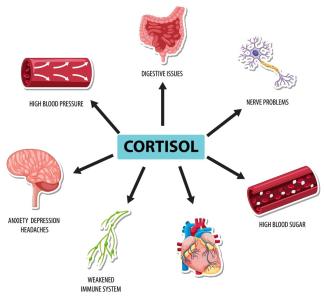
Stress is a natural and essential part of the human experience. It is the body's reaction to any change that requires an adjustment or response. While short-term stress can be beneficial by triggering the fight-or-flight response, prolonged stress can lead to various health issues, including weight gain. One of the primary culprits behind this stress-induced weight gain is the hormone cortisol.
This comprehensive guide explores how stress makes you gain weight due to cortisol, the role cortisol plays in the body, how it stimulates fat storage, why it increases appetite, and how you can manage stress to control cortisol levels and prevent unwanted weight gain.
What Is Cortisol?
Cortisol is a steroid hormone produced by the adrenal glands, located above the kidneys. It is released in response to stress and low blood-glucose concentration. Often referred to as the "stress hormone," cortisol plays several critical roles in the body, including:
- Regulating metabolism: Cortisol helps control how the body uses fats, proteins, and carbohydrates.
- Reducing inflammation: It has anti-inflammatory properties, which is why corticosteroids are used to treat inflammatory conditions.
- Regulating blood pressure: Cortisol helps regulate salt and water balance, which in turn influences blood pressure.
- Increasing blood sugar: During stress, cortisol increases blood glucose levels to provide the body with a quick source of energy.
- Suppressing the immune system: Prolonged high levels of cortisol can weaken the immune response.
While cortisol is essential for these functions, its role in stress management and metabolism can become problematic when stress is chronic.
How Does Stress Make You Fat?
Cortisol has a direct impact on weight gain, especially when stress becomes chronic. Understanding how cortisol influences fat storage and appetite is key to grasping the relationship between stress and weight gain.
1. Cortisol and Fat Storage: A Direct Relationship
When the body is under stress, the hypothalamic-pituitary-adrenal (HPA) axis is activated. This system controls the body's response to stress and includes the hypothalamus, the pituitary gland, and the adrenal glands. Once activated, the adrenal glands release cortisol into the bloodstream.
In a survival context, this hormone helps you respond to danger by mobilizing energy from fat stores to fuel the body. However, in modern life, the stress we experience is often psychological rather than physical, and the energy mobilized by cortisol is not used up. Instead, the body stores it as fat, particularly in the abdominal region. Here’s how cortisol contributes to fat storage:
- Promotion of visceral fat storage: Cortisol has a greater affinity for visceral fat cells (those located deep within the abdominal cavity) than subcutaneous fat cells (those located under the skin). This means that when cortisol levels are high, fat tends to accumulate in the abdomen. Visceral fat is more metabolically active than subcutaneous fat, and it is associated with an increased risk of cardiovascular disease, diabetes, and other metabolic disorders.
- Inhibition of fat breakdown: Cortisol reduces the rate at which fat is broken down for energy (lipolysis). As a result, the body stores more fat when cortisol levels are elevated.
- Increased glucose production: Cortisol stimulates the liver to produce more glucose from proteins and fats through a process called gluconeogenesis. The excess glucose is stored as fat if it is not used for immediate energy needs.
2. Cortisol and Appetite: Why Stress Makes You Hungry
In addition to promoting fat storage, cortisol also increases appetite, particularly for high-calorie, high-fat, and high-sugar foods. This effect can be traced to the following mechanisms:
- Increased ghrelin production: Ghrelin, also known as the "hunger hormone," increases appetite and food intake. Cortisol boosts the production of ghrelin, which makes you feel hungry even if your body does not need more food.
- Suppression of leptin: Leptin is a hormone produced by fat cells that signals the brain to stop eating when energy stores are sufficient. Chronic stress and elevated cortisol levels can suppress leptin production or impair the brain’s sensitivity to leptin, leading to overeating.
- Cravings for "comfort" foods: Cortisol influences brain reward centers that increase cravings for high-calorie, high-fat, and high-sugar foods. These foods temporarily raise levels of dopamine and serotonin, neurotransmitters associated with feelings of pleasure and satisfaction. In stressful situations, people often turn to these foods for comfort, leading to overeating and weight gain.
3. Cortisol and Insulin Resistance
Cortisol also contributes to weight gain by promoting insulin resistance, a condition in which the body’s cells become less responsive to insulin, the hormone responsible for regulating blood sugar levels. Insulin resistance results in elevated blood glucose levels, prompting the pancreas to produce even more insulin. The excess insulin causes the body to store more fat, especially in the abdomen.
Additionally, insulin resistance can lead to increased fat storage in the liver, which further impairs the body’s ability to regulate blood sugar and contributes to the development of type 2 diabetes.
How Does Cortisol Stimulate the Body's Cells to Store Fat?
Cortisol's effect on fat storage is multifaceted, involving a variety of physiological processes that promote the accumulation of fat in the body. Here are the main mechanisms by which cortisol stimulates fat storage:
1. Activation of Lipoprotein Lipase (LPL)
Lipoprotein lipase (LPL) is an enzyme that plays a critical role in fat metabolism. It breaks down triglycerides in the blood into free fatty acids, which are then taken up by fat cells for storage. Cortisol increases the activity of LPL, particularly in visceral fat cells, making them more efficient at storing fat.
2. Inhibition of Hormone-Sensitive Lipase (HSL)
Hormone-sensitive lipase (HSL) is an enzyme that breaks down stored fat into fatty acids, which can then be used for energy. Cortisol inhibits HSL, reducing the rate at which fat is broken down. As a result, the body stores more fat instead of using it for energy.
3. Increased Adipogenesis
Adipogenesis is the process by which pre-adipocytes (immature fat cells) differentiate into mature fat cells. Cortisol promotes adipogenesis, leading to an increase in the number of fat cells in the body. More fat cells mean more capacity for fat storage, which contributes to weight gain over time.
4. Shifting Metabolism Toward Fat Storage
Cortisol influences metabolism by promoting the conversion of proteins and fats into glucose through gluconeogenesis. While this process provides the body with a quick source of energy during stress, it also leads to increased fat storage if the glucose is not used for energy.
In addition, cortisol reduces the body’s sensitivity to insulin, which impairs the ability to regulate blood sugar levels and promotes the storage of fat, particularly in the abdominal region.
Why Is Increased Appetite Caused by Cortisol?
Cortisol increases appetite through several mechanisms that involve both hormonal and psychological factors:
1. Cortisol and the Brain's Reward System
Cortisol affects the brain's reward system, particularly the mesolimbic pathway, which is involved in regulating pleasure and reward. During stress, cortisol increases the release of dopamine, a neurotransmitter that promotes feelings of pleasure and reward. High-calorie, high-fat, and high-sugar foods trigger the release of dopamine, creating a temporary sense of pleasure or comfort.
As a result, people under chronic stress are more likely to crave these "comfort" foods, leading to overeating and weight gain.
2. Cortisol and the Hypothalamus
The hypothalamus is the part of the brain that regulates appetite and energy balance. Cortisol can alter the function of the hypothalamus, leading to an increase in hunger and cravings for high-calorie foods.
Specifically, cortisol influences the release of neuropeptide Y (NPY), a neurotransmitter that stimulates appetite, particularly for carbohydrates. This increased appetite can lead to excessive calorie consumption, contributing to weight gain.
3. Cortisol and Ghrelin
As mentioned earlier, cortisol increases the production of ghrelin, the hunger hormone. Ghrelin levels typically rise before meals, signaling hunger, and fall after eating, signaling satiety. However, chronic stress and elevated cortisol levels can disrupt this natural cycle, leading to increased hunger and cravings for food, even when the body does not need additional energy.
How Can I Help Myself?
Managing cortisol levels and reducing stress is essential for preventing stress-related weight gain. Here are several strategies to help you manage stress and control cortisol levels:
1. Exercise Regularly
Exercise is one of the most effective ways to reduce stress and lower cortisol levels. It promotes the release of endorphins, which are natural mood enhancers, and helps regulate appetite and metabolism. However, it's important to strike a balance—intense or prolonged exercise can actually increase cortisol levels. Aim for moderate-intensity exercise, such as walking, swimming, or cycling, for at least 30 minutes a day.
2. Practice Mindfulness and Relaxation Techniques
Mindfulness practices, such as meditation, deep breathing, and yoga, can help reduce stress and lower cortisol levels. These techniques encourage relaxation and help regulate the body’s response to stress. Incorporating mindfulness into your daily routine can reduce the impact of stress on your body and mind.
3. Prioritize Sleep
Lack of sleep is a significant contributor to elevated cortisol levels. When you don’t get enough sleep, your body perceives it as a stressor, which increases cortisol production. Aim for 7-9 hours of quality sleep each night to help regulate cortisol levels and prevent stress-related weight gain.
4. Eat a Balanced Diet
A diet rich in whole foods, including fruits, vegetables, whole grains, lean proteins, and healthy fats, can help regulate cortisol levels and support overall health. Avoid excessive consumption of caffeine and sugar, as these can increase cortisol production and lead to energy crashes, which may trigger cravings for unhealthy foods.
5. Stay Hydrated
Dehydration can increase cortisol levels, so it's important to stay adequately hydrated throughout the day. Drinking plenty of water can help reduce the effects of stress on your body and support healthy metabolism.
6. Limit Alcohol Consumption
While alcohol may provide temporary relief from stress, it can increase cortisol levels in the long run. Limit your alcohol intake to prevent stress-related weight gain.
7. Seek Support
Sometimes, managing stress requires outside help. Speaking with a therapist or counselor can provide valuable support and coping strategies for dealing with stress. Cognitive-behavioral therapy (CBT) is particularly effective in helping people manage stress and reduce cortisol levels.
Stress-induced weight gain is a complex process, largely driven by the hormone cortisol. Cortisol plays a critical role in regulating metabolism, fat storage, and appetite, but chronic stress can lead to elevated cortisol levels, promoting weight gain, particularly in the abdominal region. By understanding how cortisol influences fat storage and appetite, and by adopting stress management strategies such as regular exercise, mindfulness practices, and a balanced diet, you can reduce the impact of stress on your body and prevent unwanted weight gain.
Incorporating these practices into your daily routine will not only help you manage cortisol levels but also improve your overall health and well-being. Remember, managing stress is a lifelong process, and taking steps to reduce its impact on your body can lead to lasting positive changes.






